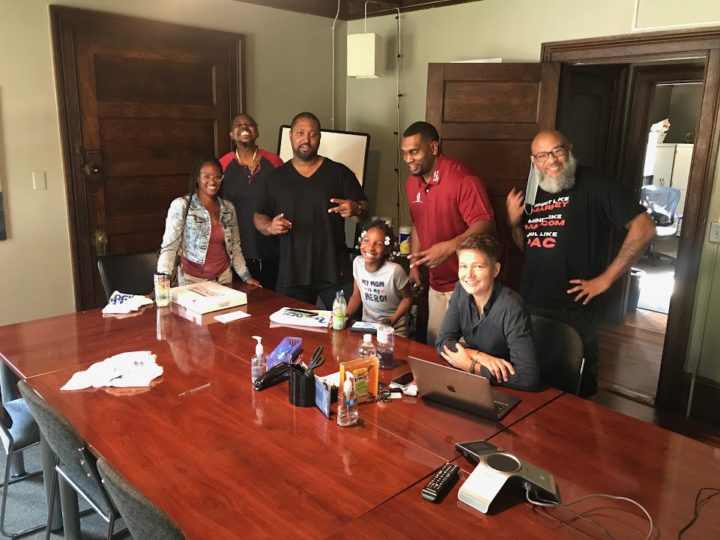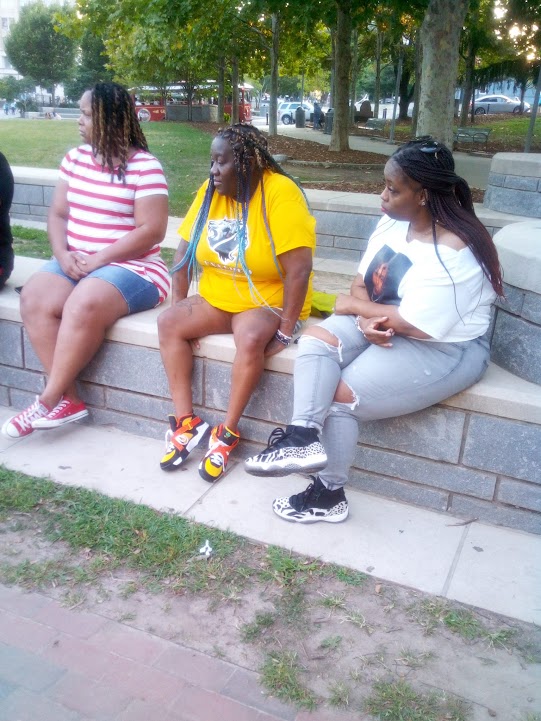Days after what would have been her son’s 19th birthday, Javelin Duncan organized her first public rally. Titled “Enough,” it brought together about a dozen parents who, like Duncan, had lost their children to gun violence. Her son Teylyn McAlpin, then 17, was killed Nov. 28, 2020, near a baseball field in Montford; Duncan has since moved to Charlotte.
“You know how you count down birthdays? We don’t count down birthdays, we count down death dates and anniversary dates,” she told Xpress. “It’s going to be two years, and my son’s killer is still out there on the run.”
At the time, two suspects were charged with first-degree murder — a 16-year-old minor and Dionate Whitson, who was several years older and is still at large today. Although Whitson was initially questioned by police, he was released and has since disappeared.
So far in 2022, there have been 11 homicides in Asheville, the second-highest count in the last decade. (In 2018, there were 12.) As of Sept. 15, there had been 32 gunshot victims in the city, up from 24 through the same date last year. Aggravated assault, involving serious injury or use of a deadly weapon, was up by 44%.
Duncan says that she and parents like her have had enough. The group met in Pack Square Park on Sept. 17 to shine a spotlight on gun violence and demand justice. “I’m hoping that the right person or people or group will look at this and say, ‘What is going on in Asheville? What are all these cold cases? Why are all these families asking for justice for their kids and nothing is being done?’” Duncan wonders.
According to Capt. Joe Silberman of the Asheville Police Department’s Criminal Investigations Division, there is “really no hard, hard definition” for a cold case because each one is “unique.” Accordingly, the department views its cases as either open or solved.
In the last five years, Asheville has seen 52 homicides, and 16 remain open. McAlpin’s case is considered solved because two suspects have been charged, even though Whitson isn’t in custody. In such cases, Silberman explains, the APD continues to investigate tips related to a suspect’s whereabouts and works closely with the U.S. Marshals Service.
Council no-shows
Duncan plans to organize a second rally in January but is waiting to hear back from the city before setting a date. She says she was disappointed by City Council members’ failure to attend the September event after she’d reached out to all of them: One sent regrets, and the others didn’t respond at all, Duncan reports.
During a July 26 City Council meeting, just after this year’s 11th homicide and the third shooting in three weeks, Vice Mayor Sheneika Smith suggested that Council members help organize a violence-interruption program that would go “beyond the Public Safety Committee” and have “autonomy from, but alignment with, APD.” She suggested working with the city’s Office of Equity and Inclusion to come up with a plan.
Smith did not return requests for comment on any progress in setting up such a program, and city spokesperson Kim Miller said that as of Nov. 4, there weren’t any new programs or initiatives on the docket.
But while there is no formal program in place, Samantha Booth, the APD’s public information officer, says her department “continually meets with and receives feedback from the community. Over 100 community meetings have been attended in the 2022 calendar year thus far. … The Asheville Police Department approaches each of these meetings as an opportunity to learn what is most impacting that particular community. We are always open to learning more from our neighborhood leaders.”
Meanwhile, Marcus Kirkman of the Office of Equity and Inclusion released the following statement: “I am and our office is committed to improving our community and neighborhoods in every way that we can, up to and including reducing the amount of violence, specifically gun violence, and the many factors along with underlying social issues that contribute to these conditions.”
Tips and casings
Silberman, however, says he’s reluctant to initiate further work with community groups.
“I’m not going to go on a campaign or have my people go on any campaigns,” he told Xpress. “If we’re invited to a meeting, I would definitely come or send representatives.”
In an effort to reduce gun violence and solve open homicide cases, Silberman continued, “We actively pursued [community groups and partnerships] for a number of years and put a lot of manpower and salaries and funding into that … and I’m not able to cite an example of success.”
Instead, the APD has been pumping resources into internal efforts to curb gun violence. A tip line announced in December 2020 has been the most helpful, notes Silberman. TIP2APD enables anyone to submit information anonymously simply by downloading an app or sending text messages that go directly to detectives.
Despite the program’s success — Silberman says it regularly receives tips related to gun violence — information alone won’t necessarily enable police to apprehend a suspect.
“We have to independently verify the information that we’ve been given,” notes Sgt. Josh Meindl, who heads the APD’s forensic services unit. “Anonymous tips can point us in that direction, but there’s a lot of legwork to do before we can translate that into a criminal charge.”
The department is hoping that a Ballistics IQ system purchased earlier this year will help speed things up, he says. Previously, police would submit shell casings found during investigations to a crime lab in Henderson County that serves 50 counties across the state. It could take weeks and sometimes months for results to come back. With the new system, the APD will have data within minutes.
“It can tell us how many firearms are involved in the incident. It can tell us if it links to any other incidents that have been previously entered into the database. It can even tell us … what types of firearms could have fired that shell casing. It gives us a lot of information very quickly.”
This year alone, the APD has recovered over 600 shell casings. The system also enables police to map where they were found. “It’s no big secret” that shots are often fired around public housing communities, says Meindl.
No magic wand
David Nash, executive director of the Asheville Housing Authority, says the APD used to have a dedicated housing team whose nine officers identified hot spots in public housing communities, worked directly with their managers and built relationships with residents. Those efforts, he believes, made a difference. But over the past few years, as the department saw its staff shrink by 41%, the team slowly dwindled.
In October, Nash says he received a call saying the APD would no longer be assigning officers to the housing team. He got the impression that it could be years before the team was back at full or even reduced capacity.
“We should all be pushing to rebuild APD,” says Nash. “That can come with direction from city leadership to engage in more community policing, not just law enforcement: for police to be present, so relationships can be built and dangerous activity that can lead to gun violence can be deterred.”
He believes that much of the violence in public housing developments comes from perpetrators who don’t live there and that residents aren’t targeted so much as they’re caught in the crossfire. This, Nash maintains, stems from the city’s willingness to tolerate violence within those communities.
In other neighborhoods, he continues, people call, and the police respond, but in public housing, “Folks don’t have as much political power, or they feel intimidated, so they don’t call as often.” Silberman and Meindl agreed that witnesses are often hesitant to come forward for fear of retaliation.
In the midst of all this, the Housing Authority has tried several approaches to making those communities safer. Camera systems installed there are linked directly to the Buncombe County Sheriff’s Office, after-school learning pods at the Arthur Edington Education and Career Center are designed to “keep young people engaged and out of crime,” and the redevelopment of Lee Walker Heights (now known as Maple Crest) created housing that people can feel good about protecting and keeping up.
Although none of those efforts is a “magic wand” that could “end all crime,” Nash says he’s hopeful that future efforts supported by a federal grant the county recently received will have an impact.
Meeting residents’ needs
In September, Buncombe County was awarded a $1.5 million grant from the U.S. Department of Justice to continue and expand violence-interruption work begun early in 2021. The new grant will enable the county to hire three community health workers trained in violence prevention and a grants/program manager for the Buncombe County Community Safety Initiative. It will also allow three organizations already working on the problem — the SPARC Foundation, My Daddy Taught Me That and Resources for Resilience — to continue their efforts.
With the 2021 funding, the SPARC Foundation’s focus “was to address as many of the challenges of the individuals and families living in those communities as we could,” Executive Director Jackie Latek explains. The foundation and its partners organized a street team that meets regularly with community members and comes up with programming to address their needs. Most of the team members grew up in the target communities, have been involved with the criminal justice system or have been in recovery themselves.

Much of their work has involved things like helping older adults with grocery shopping or trips to pharmacies, but the program has also organized social opportunities such as bingo games, dance parties, basketball games and children’s activities that give residents a chance to come together safely. The street team has been working in Maple Crest and the Pisgah View Apartments and recently began offering after-school programs at Klondyke, Maple Crest and Hillcrest.
In addition, Resources for Resilience has been leading regular listening circles at Hillcrest. In the hourlong groups facilitated by senior implementation specialist MC Ellis, residents can share their challenges and learn stress management techniques.
“When I’m jolted, when I don’t feel safe, part of my brain — my amygdala — sends an alarm bell and sends me into fight-or-flight or freeze response,” notes Ann DuPre Rogers, the nonprofit’s executive director. “So rather than my thinking brain — where I can problem-solve and be creative and connect and make good decisions — rational thought kind of goes out the window temporarily, and I go into survival mode. It’s fight-or-flight that, to me, is behind gun violence.”
With the additional funding, Resources for Resilience hopes to establish listening circles in more of the city’s public housing communities.
Get involved
Latek, however, emphasizes that it will take much more than a few small-scale initiatives to really put a significant dent in gun violence.
“Everybody loves to look to one group or entity to solve the gun violence that we’re experiencing, and what I’m starting to realize is that every single one of us in this community can be a part of solving this problem,” she says. “It’s landlords offering reasonable rental prices or taking Section 8 vouchers. It’s business owners paying a living wage and being willing to hire people who need a second chance who might have criminal backgrounds. It’s the city staff ensuring that every community has access to parks and community centers. And it’s any individual in the community who can go volunteer. … Everybody’s a piece of this.”



Guns are not violent. They are misused by violent people. Violence prevention begins at home.